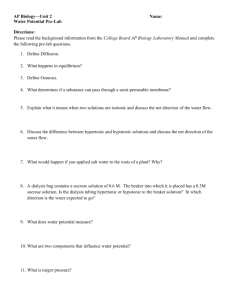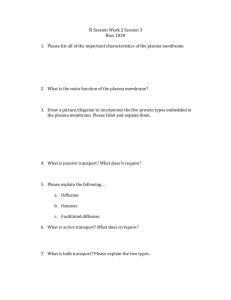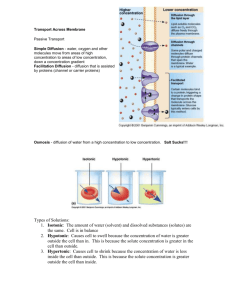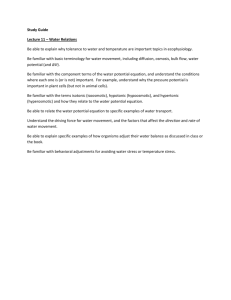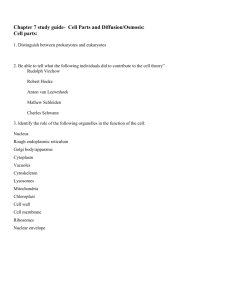Cell Transport Lab: Diffusion & Osmosis in Anatomy
advertisement
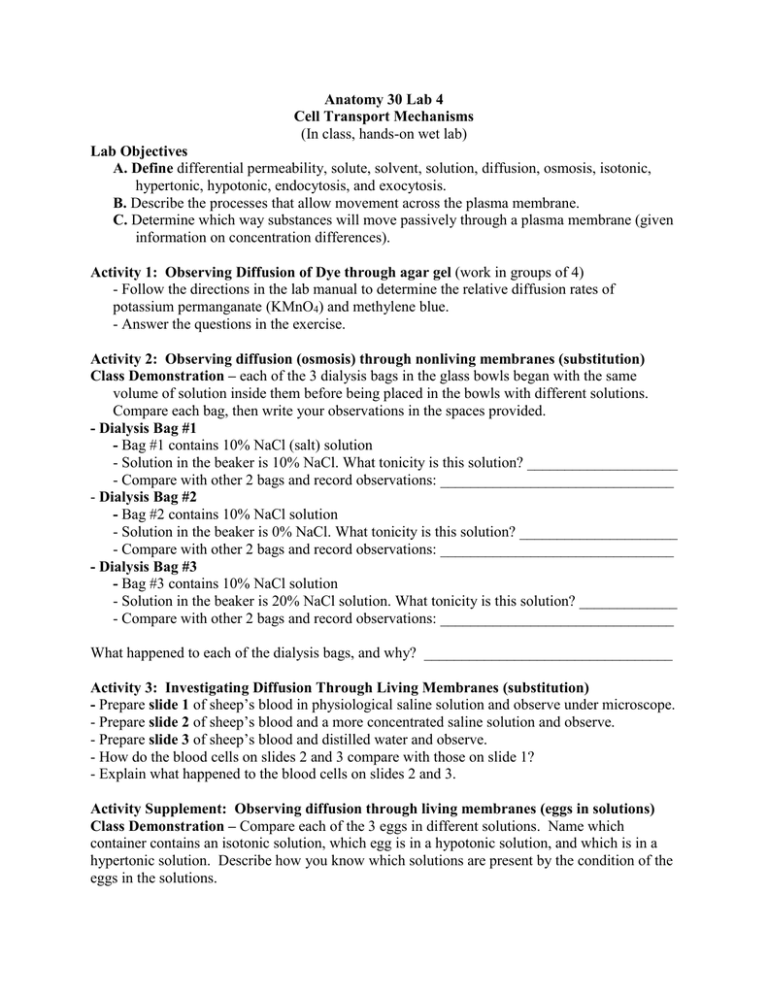
Anatomy 30 Lab 4 Cell Transport Mechanisms (In class, hands-on wet lab) Lab Objectives A. Define differential permeability, solute, solvent, solution, diffusion, osmosis, isotonic, hypertonic, hypotonic, endocytosis, and exocytosis. B. Describe the processes that allow movement across the plasma membrane. C. Determine which way substances will move passively through a plasma membrane (given information on concentration differences). Activity 1: Observing Diffusion of Dye through agar gel (work in groups of 4) - Follow the directions in the lab manual to determine the relative diffusion rates of potassium permanganate (KMnO4) and methylene blue. - Answer the questions in the exercise. Activity 2: Observing diffusion (osmosis) through nonliving membranes (substitution) Class Demonstration – each of the 3 dialysis bags in the glass bowls began with the same volume of solution inside them before being placed in the bowls with different solutions. Compare each bag, then write your observations in the spaces provided. - Dialysis Bag #1 - Bag #1 contains 10% NaCl (salt) solution - Solution in the beaker is 10% NaCl. What tonicity is this solution? ____________________ - Compare with other 2 bags and record observations: _______________________________ - Dialysis Bag #2 - Bag #2 contains 10% NaCl solution - Solution in the beaker is 0% NaCl. What tonicity is this solution? _____________________ - Compare with other 2 bags and record observations: _______________________________ - Dialysis Bag #3 - Bag #3 contains 10% NaCl solution - Solution in the beaker is 20% NaCl solution. What tonicity is this solution? _____________ - Compare with other 2 bags and record observations: _______________________________ What happened to each of the dialysis bags, and why? _________________________________ Activity 3: Investigating Diffusion Through Living Membranes (substitution) - Prepare slide 1 of sheep’s blood in physiological saline solution and observe under microscope. - Prepare slide 2 of sheep’s blood and a more concentrated saline solution and observe. - Prepare slide 3 of sheep’s blood and distilled water and observe. - How do the blood cells on slides 2 and 3 compare with those on slide 1? - Explain what happened to the blood cells on slides 2 and 3. Activity Supplement: Observing diffusion through living membranes (eggs in solutions) Class Demonstration – Compare each of the 3 eggs in different solutions. Name which container contains an isotonic solution, which egg is in a hypotonic solution, and which is in a hypertonic solution. Describe how you know which solutions are present by the condition of the eggs in the solutions. Define the following terms used in this lab: Differentially permeable membrane ________________________________________________ _____________________________________________________________________________ Simple Diffusion _______________________________________________________________ _____________________________________________________________________________ Osmosis ______________________________________________________________________ _____________________________________________________________________________ Facilitated Diffusion ____________________________________________________________ _____________________________________________________________________________ Active Transport _______________________________________________________________ _____________________________________________________________________________ Solute ________________________________________________________________________ Solvent _______________________________________________________________________ Solution ______________________________________________________________________ Hypotonic solution ______________________________________________________________ ______________________________________________________________________________ Isotonic solution ________________________________________________________________ ______________________________________________________________________________ Hypertonic solution _____________________________________________________________ ______________________________________________________________________________ Endocytosis ___________________________________________________________________ _____________________________________________________________________________ Exocytosis ____________________________________________________________________ Complete the Lab 4 Review Sheets on pp. 35-36, omitting question 4.
